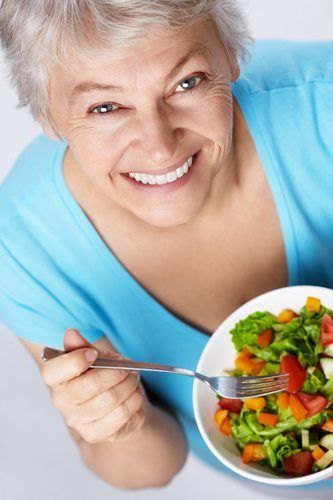Eating a balanced diet of nutritious foods is important at every age. Although many dietary recommendations remain the same throughout our lives (eat lots of vegetables, for example), others materialize and disappear as we age. In addition, many adults have unique dietary needs due to medications and health conditions (like diabetes, high blood pressure, and high cholesterol). If you would like to improve your health and feel truly nourished after meals, check out our nutrition tips for the elderly. In addition, be sure to discuss your diet with your doctor to account for specific health concerns, conditions, and medications.
Nutrition Tips for the Elderly
Eat balanced meals. Throughout your day, you need to ingest a variety of nutrients. To ensure that you’re creating healthy meals, add these five items to your plate:
- Vegetables: Fill nearly half your plate with a variety of vegetables, but don’t count potatoes.
- Fruits: Eat plenty of colorful fruits. Try eating fruit for dessert instead of sugary, processed sweets.
- Lean Protein: About one-quarter of your plate should contain fish, poultry, beans, or nuts. Limit your intake of red meat, processed meats, and cheese.
- Whole Grains: About one-quarter of your plate should contain brown rice, oats, barley, whole-wheat bread, or other whole grains.
- Healthy Oils: Use a little oil for cooking or as a dressing, such as olive oil and canola oil. Limit your intake of butter and trans fats.
These recommendations come from The Healthy Eating Plate, which was created by experts at the Harvard School of Public Health and Harvard Medical School to help consumers make healthy dietary choices.
Focus on fiber. As we age, our digestive systems become more prone to complications. To promote regularity, prevent heart disease, and avoid diabetes and other ailments, focus on getting plenty of fiber every day. Examples of high-fiber foods include black beans, lentils, whole-wheat pasta, barley, and green beans.
Limit your salt intake. Although it adds a lot of flavor, salt also increases your risk of having a stroke or developing heart disease. The best way to lower your salt intake is to limit your consumption of processed foods. Ideally, you should eat no more than 1,500 mg of sodium each day (which is about half a teaspoon).
Avoid sugar. Limit your intake of sweets like cakes, cookies, and candy, but also avoid foods that contain “hidden sugars.” You can find sugar in many products that you wouldn’t expect to contain sugar at all, such as tomato sauce, bread, salad dressing, and crackers. Check the nutrition label, searching for sugar and its many aliases (sucrose, cane juice, simple syrup, high-fructose corn syrup, etc).
Drink plenty of water. Although many seniors find that they aren’t thirsty very often, that doesn’t mean that hydration isn’t important. Try to keep a glass or bottle of water nearby at all times. Although you can also drink tea and coffee if you like, limit your intake of soda, milk, juice, and alcohol.
_____
It may be hard to embrace all of these nutrition tips for the elderly, especially if they force you to eat way outside of your comfort zone. So instead of going “all out” or “cold turkey,” try to incorporate this advice into your daily routine gradually. Before you know it, you’ll be eating a healthy diet and feeling better than ever!
Looking for an assisted living community in Tennessee? Check out Hearthside Senior Living in Collierville. Our warm and inviting community makes it easy for seniors to embrace a healthy lifestyle, with home-cooked and restaurant-style meals, exercise classes, and a nurse devoted to residents’ health and wellness. To learn more about our amenities and services, please give us a call at 901-854-6590 or contact us online.

